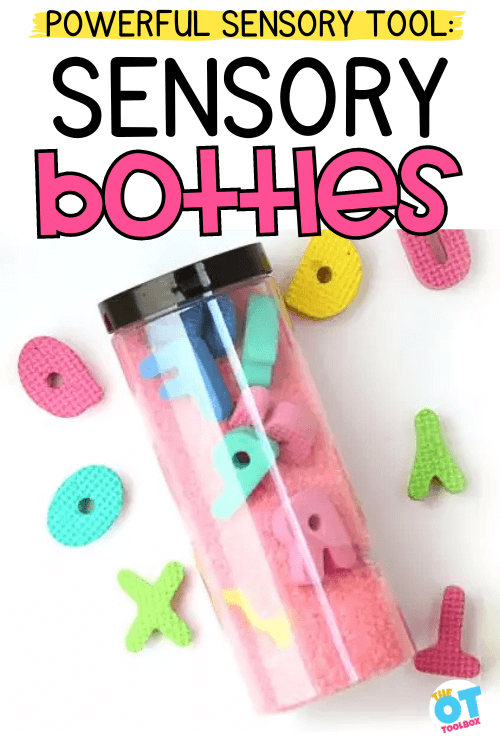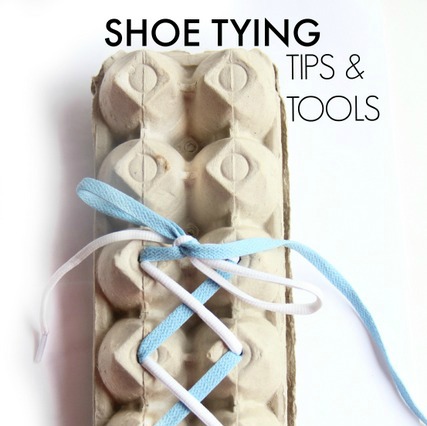Shoe tying can be trying for little ones, and that’s where this shoe tying activity comes in. This shoe tying egg carton activity is one we developed in 2015, and it’s been shared thousands of times. Here’s why: This hands-on shoe tying task helps kids establish the skills they need to learn to tie their shoes in a fun and stress-free manner.
Shoe Tying ACtivity
Shoe Tying Egg Carton Activity
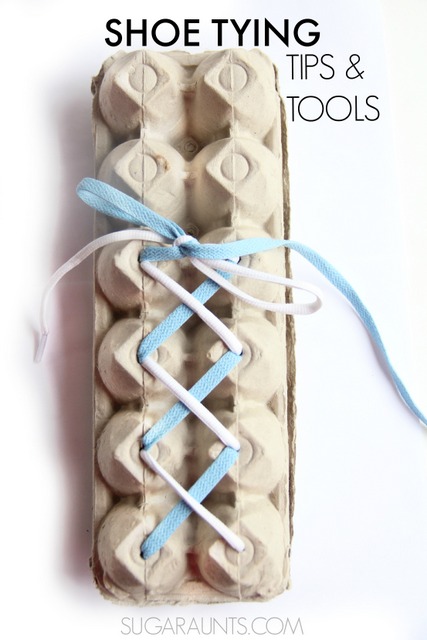
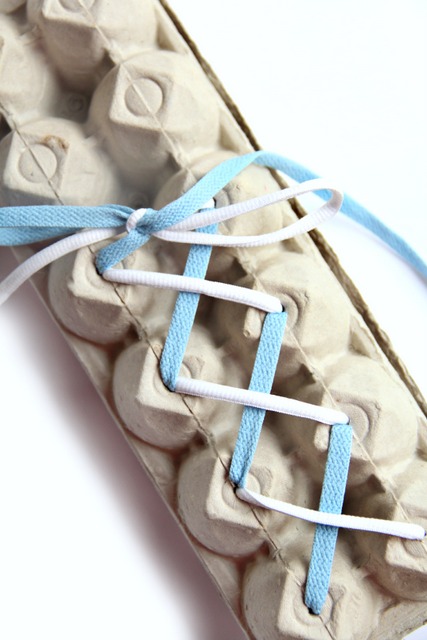
- Start with a cardboard egg carton. If you like, give it a quick spray with disinfectant spray
when the kids are not around and let the disinfectant dry. I don’t typically do this step, though. We just try to make sure to wash our hands after playing with egg cartons.
- Make the holes for the laces. We used golf tees and a hammer for this part. See how here. It’s a fun proprioceptive activity for kids that is always a hit in our house.
- Grab a set of shoe laces. Using two different colors is best for new shoe tying friends.
- Tie the laces together at one end and thread them through the holes of the egg carton.
- Start lacing the holes the whole way up the egg carton. Threading the holes is an excellent fine motor task for kids. My three year old loved this and wanted to take the laces out and do it again. Threading the laces encourages bilateral hand coordination which is vital for shoe tying.
- Now we’re ready to practice tying shoes!
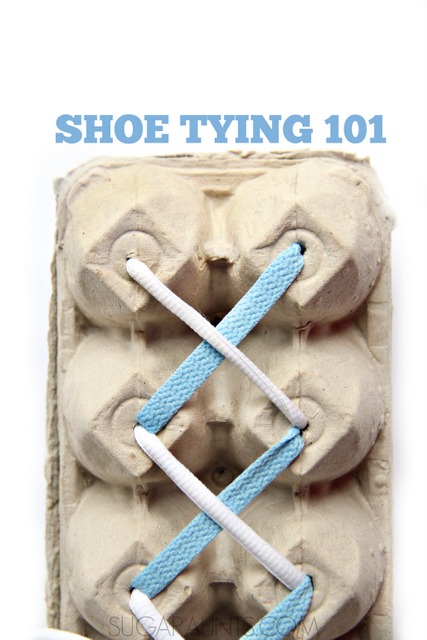
Shoe Tying Tips
Many times, children are excited to learn to tie their shoes. Embrace it, go with it, and practice! But other times, they just don’t want to learn. That’s ok! Don’t force them and come back to practicing in a week or two.
If kids get frustrated with the shoe tying activity, the struggle to get them to sit down can be a difficult thing to overcome from the very beginning and only make the practice time more difficult. If that is the case, give them time, and revisit shoe tying in a week or two.
The key to teaching kids to tie their own shoes is calm, quiet, practice. It’s easy for kids to get upset, frustrated, or anxious when there are so many steps and may feel rushed or upset about their fumbling fingers. They might have Velcro shoes that they are perfectly happy to pull on quite quickly.
With my older child and from helping lots of kids learn to tie their shoes, I’ve seen the incentive of a new pair of sneakers with laces bring on the ambition to give it a shot.
Other times, it’s a creative way to practice, simplified directions, or learning steps in chunks that gives kids an oomph of “hey! I CAN do this!”
Shoe Tying Activities
Here are some more shoe tying activities and tips:
- Consistent verbal cues for each step. Use the same words each time.
- Practice with the shoe in your child’s lap, not on their foot. Once they master shoe tying (or at least start to get the hang of it), then practice with their shoe on their foot. It will then take more practice with the shoe on their foot because when they are wearing the shoe, the laces shorten a bit.
- Tying shoes has a lot to do with visual perceptual skills. You’ll find easy and fun ways to work on visual perceptual skills through play here.
- Place the shoe in their lap or on the floor positioned with the heel close to them and the toe pointing away.
- Practice with two different colored shoe laces.
- Tie your own shoe as you prompt your child to tie theirs. Do the steps at the same time. Sit beside and position your shoe slightly in front of your child. You want them to see your shoe as a model in the same position as yours and in a place where they can see your shoe without having to turn their head to much.
- Avoid saying “right” and “left” when talking about the different strings. Keeping track of the right/left sides can complicate things for a young child. Use the names of the laces if you are using two different colored laces or just say, “the lace on this side of the shoe”, or the “Pick up the lace with the hand you write with.”
- Work in chunks. Practice only the first step until your child masters that part. Then, teach the next step and work on those tow steps together before moving onto the next step.
- Practice with items other than laces. Shoe laces can be very difficult for young kids to manage. If they have any trouble with fine motor skills or bilateral hand coordination, it is especially difficult. Try practicing with stiff shoe laces, wire-edged ribbons, pipe cleaners (twist the ends of two together for length!), or Wikki Stix.
- When you get to the step where your child pinches the loop, make sure they are holding it close to the shoe. If they are pinching the loop too far from the shoe, the knot will be too loose.
- If you’ve been practicing shoe tying for some time and your child is just having too much difficulty, it might be other underlying reasons. To tie shoes, kids need fine motor skills, bilateral hand coordination, visual perceptual skills, hand-eye coordination, and hand strength just to get the task of shoe tying done. If you feel your child has a difficulty in one of these areas, contact your pediatrician for a referral to an Occupational Therapist for individual evaluation and treatment.
- I like the simplified steps below for shoe tying. They are simple and easy for kids to remember. Write them down and read them as you go through shoe tying with your child. Our newsletter subscribers can get the image below as a free printable. J
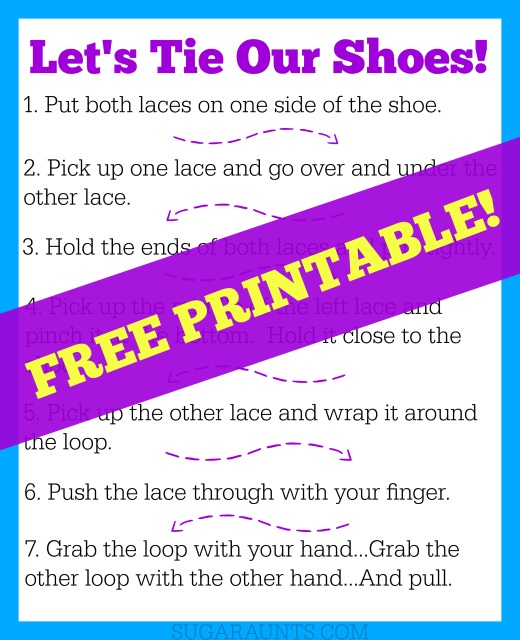
Shoe Tying Task Analysis
Breaking down the steps to shoe tying and deciphering where the struggle is happening can be a huge part of addressing shoe tying struggles. Use this list of steps to tie shoes to assess where the break down is occurring.
Next, look at the underlying areas that play into that aspect of tying shoes. Is it fine motor coordination? Pinch strength? Crossing midline? Bilateral coordination? Attention and focus? All of these areas play into the overall task analysis of shoe tying.
Then, focus on addressing those skills during the functional task itself.
Let’s take a look at each step of shoe tying:
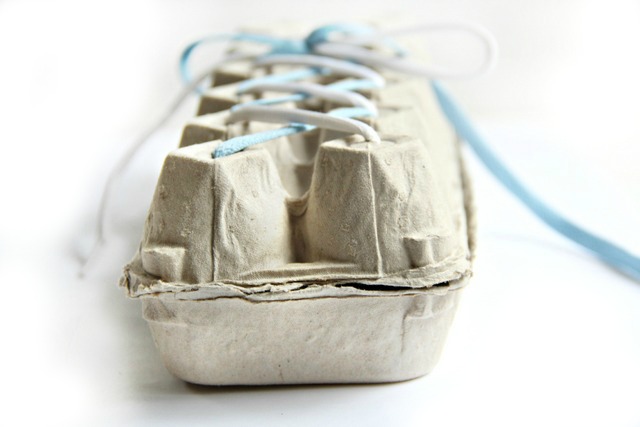
More Shoe Tying Activities
Looking for more ways to practice shoe tying with kids? These toys and tools are fun ways to practice with kids.
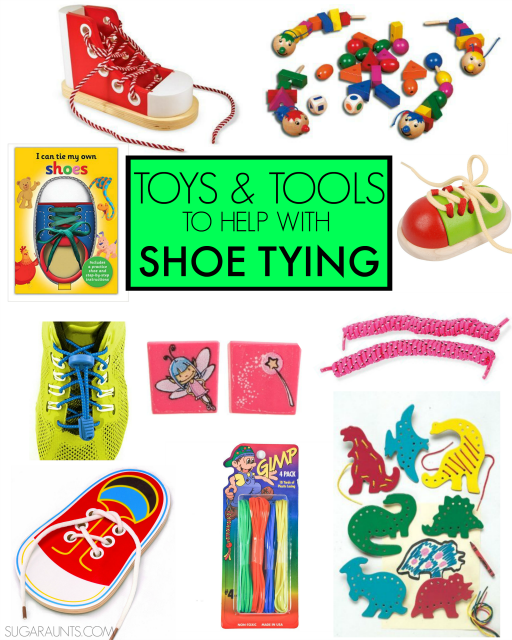
Shoe Tying Toys
- This Melissa & Doug Deluxe Wood Lacing Sneaker
is a great practice tool, with it’s bright colors and stiffer laces than the ones typically on shoes that we wear. Practice on the model before moving to your child’s real shoe.
- If you have a little one who loves to read, this I Can Tie My Own Shoes Book
is a real incentive to practice shoe tying.
- The Original Toy Company Tie Me Lacing Shoe
is another fun model shoe with bright and bold colors. This is a good toy to take along on outings with it’s flat shape.
- PlanToys Plan Preschool Tie-Up Shoe Preschool
is another fun shoe to practice tying
- Sometimes, kids just can’t get the hang of shoe tying no matter how hard they try. These Tie Buddies Shoe Accessory
are great for kids that have trouble at the “loop part” of shoe tying. They eliminate the loops and give kids something to hold onto while tying. Kids with hand weakness will benefit from this tool.
- Another modification to shoe tying are these No Tie Shoe Lock Laces
. They can be laced in shoes and help the child’s shoe stay snug.
- Magic Shoelaces
are another way to modify shoe tying. Use these until your child is ready and able to practice effectively. They are great laces for kids with difficulties in any of the underlying skills needed for shoe tying.
- I love a creative practice technique when it comes to any skill for kids. This Plastic Lacing Cord
is an excellent way to practice shoe tying with a more resistive lace. Use them in place of shoelaces in the egg carton activity that we shared today.
- Lacing & Tracing Dinosaurs
can help kids with lacing, managing strings, threading, bilateral hand coordination, and strength. It’s a great precursor activity to practicing shoe tying. Try these Lacing & Tracing Sea Life
cards, too.
- For more functional and appropriate play to work on shoe tying, I love this Colorful Caterpillars Game
. It works on bilateral hand coordination and strength needed to tie shoes with dexterity and ease.

I hope you were able to find some helpful tips and tools in this post.
Love this post? Pin it! And don’t forget to use that shoe tying joke! Jokes help with shoe tying 🙂
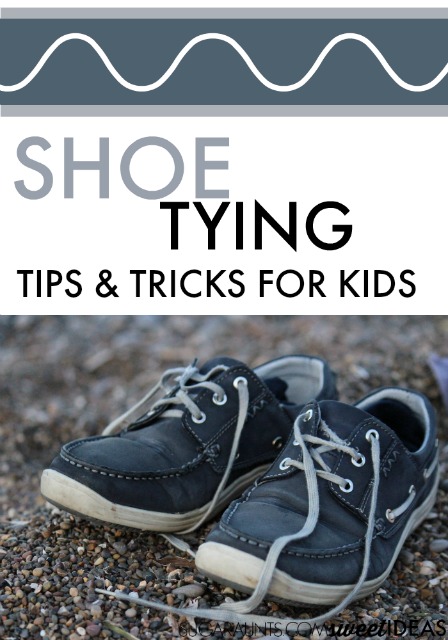

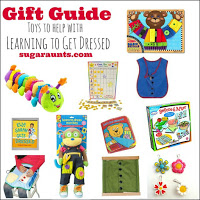

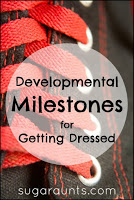

Colleen Beck, OTR/L has been an occupational therapist since 2000, working in school-based, hand therapy, outpatient peds, EI, and SNF. Colleen created The OT Toolbox to inspire therapists, teachers, and parents with easy and fun tools to help children thrive. Read her story about going from an OT making $3/hour (after paying for kids’ childcare) to a full-time OT resource creator for millions of readers. Want to collaborate? Send an email to contact@theottoolbox.com.

